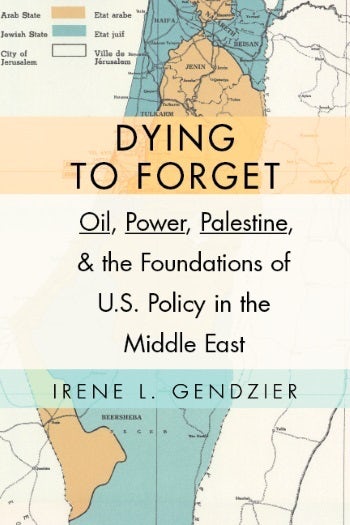Irene L. Gendzier presents incontrovertible evidence that oil politics played a significant role in the founding of Israel, the policy then adopted by the United States toward Palestinians, and subsequent U.S. involvement in the region. Consulting declassified U.S. government sources, as well as papers in the H.S. Truman Library, she uncovers little-known features of U.S. involvement in the region, including significant exchanges in the winter and spring of 1948 between the director of the Oil and Gas Division of the Interior Department and the representative of the Jewish Agency in the United States, months before Israel's independence and recognition by President Truman.
Gendzier also shows that U.S. consuls and representatives abroad informed State Department officials, including the Secretary of State and the President, of the deleterious consequences of partition in Palestine. Yet the attempt to reconsider partition and replace it with a UN trusteeship for Palestine failed, jettisoned by Israel's declaration of independence. The results altered the regional balance of power and Washington's calculations of policy toward the new state. Prior to that, Gendzier reveals the U.S. endorsed the repatriation of Palestinian refugees in accord with UNGA Res 194 of Dec. 11, 1948, in addition to the resolution of territorial claims, the definition of boundaries, and the internationalization of Jerusalem. But U.S. interests in the Middle East, notably the protection of American oil interests, led U.S. officials to rethink Israel's military potential as a strategic ally. Washington then deferred to Israel with respect to the repatriation of Palestinian refugees, the question of boundaries, and the fate of Jerusalem—issues that U.S. officials have come to realize are central to the 1948 conflict and its aftermath.
- Table of Contents
- Acknowledgments
- Preface to the Paperback Edition: The U.S. Record on Israwl and Palestine, 1948
- Introduction: Open Secrets
- Part I: The Postwar Petroleum Order and the Palestine Question, 1945–1946
- 1. The Primacy of Oil
- 2. The Palestine Question: 1945
- Part II: The Question of Partition and the Oil Connection, 1947–1948
- 3. The Critical Year: 1947
- 4. The Winter of Discontent: 1948
- 5. The Oil Connection
- Part III: Beware “Anomalous Situations,” 1948
- 6. The Transformation of Palestine
- 7. Truce and Trusteeship
- 8. Recognition and Response
- Part IV: Rethinking U.S. Policy in Palestine/Israel, 1948
- 9. Reconsidering U.S. Policy in Palestine
- 10. The Palestine Refugee Problem
- 11. The State Department on the Record
- Part V: The End as the Beginning, 1948–49
- 12. The PCC, Armistice, Lausanne, and Palestinian Refugees
- 13. The View from the Pentagon and the National Security Council
- 14. The Israeli–U.S. Oil Connection and Expanding U.S. Oil Interests
- Part VI: In Place of a Conclusion
- Reflections on Discovery, Denial, and Deferral
- Notes
- Index

